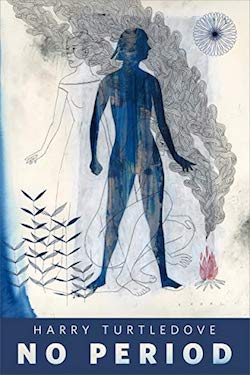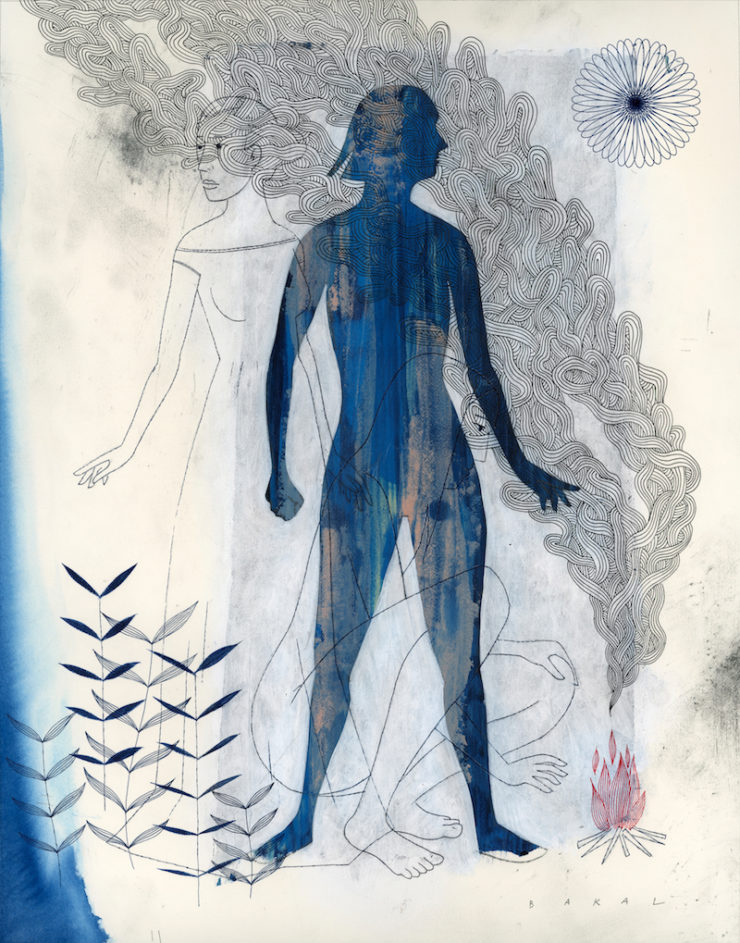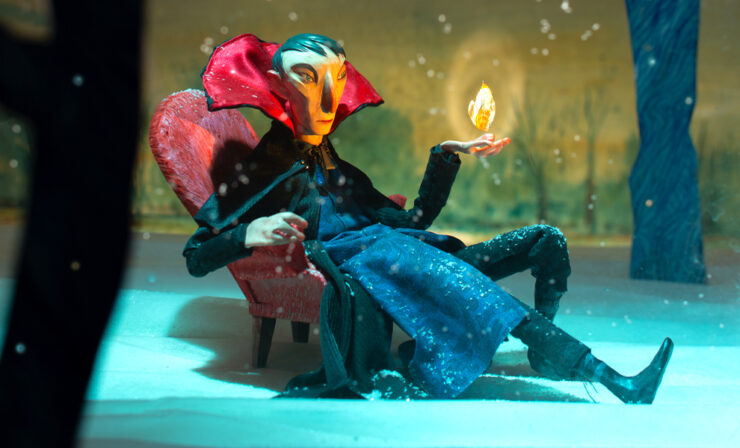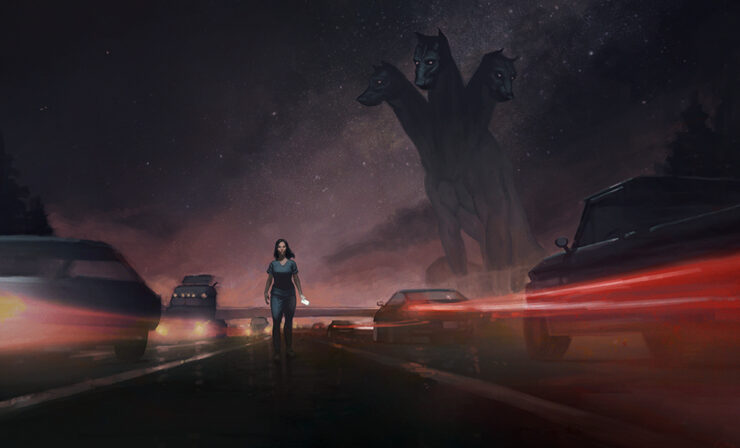A man sets out to tell a story of his ex, which in turns becomes a story of the world. If only he could change that story—find the moment where it all began and alter the past. But what if he can’t find the beginning—or even the end?
Buy the Book


No Period
isn’t the way I meant to tell this story (and, as a matter of fact, I don’t think this is exactly the story I intended to tell), but there you are—life is like that sometimes, when something perfectly clear to everybody else is perfectly opaque to you, so for instance after a bad breakup you’re crazy for a couple of years and all your friends can see it plain as global warming but to you the world seems to grow a knife-edged, brutal clarity it never had before, which makes you go out and do stupid things you think are smart: for instance when your new squeeze picks up a book you know you also want you go and buy your own copy and she thinks you don’t love her because aren’t the two of you a unit and don’t you have things together but in fact that’s the furthest thing from your mind since you’re still crazy—to you, it’s only a sensible insurance policy so you can know you will still have the goddamn book if after five or ten or fifteen years you go through another breakup, which will do you no good at all when forty years later you try to explain your reasoning—if it is reasoning—to the grown daughter you have on account of you and your new squeeze didn’t break up after all, since that grown daughter, who by then has been through some breakups of her own, knows only too well how crazy they make people and wonders why you didn’t listen to your friends when they told you you were nuts; and that makes you want to quote Robert Burns at her—you know, the bit about Oh wad some power the giftie gie us/ To see oursels as others see us!, only for one thing there ain’t no such power, and for another thing she knows it as well as you do—probably better, truth to tell, since her breakups are fresher and less scarred over than yours—and for a third thing you try to put on a Scots burr, of which you own what must be the worst in the whole entire complete world, which sets her to giggling helplessly, only that turns out not to be all bad since once she’s done giggling she’s willing to let you change the subject (fair enough, as you proved you didn’t know what the fuck you were talking about before), the trouble being that you have a bitch of a time figuring out what to say next without sounding like a stupid old fart or trying to sound like somebody her age instead of yours, which is only another, more pathetic, way of sounding like a stupid old fart, and so you clam up—often the smartest thing a stupid old fart can do—but even that doesn’t work, because when you don’t say anything she blames you for refusing to communicate with her, not understanding how there can never be any real communication across generations since you’ve been to a lot of places she’s still on the way to, places you would spare her from if you could but you know you can’t because the only way not to go to those places of sorrow and sickness and tiredness and wearing down and graying and wrinkling and sleeping badly for too many good reasons is to die before you get to them, and that still feels like the short end of the stick to you, even if it feels less so than it did ten years ago and ever so much less than it did twenty years ago, and so you sit there, not communicating, and your remember trying to explain to your mother why you and your ex were getting a divorce, and you remember most of all her pained and utter incomprehension, and you realize that noncommunication across generations isn’t a one-way street but two-, and remembering sitting on that couch in the house where you grew up, the couch you sat on when you were not only a young man but also a little kid, does a Marcel Proust on you, so suddenly, graying and wrinkling and sleeping badly be damned, you are your young self again (inside your head, anyway—your daughter totally misses the transubstantiation, which only goes to show neither one of you was a Catholic to begin with), wondering how the devil you and your ex might have made it click after all since it wasn’t one of those messes when you look around after the first fire of lust fades a little and you wonder what the hell you were thinking but more like a near miss where you can’t help thinking if only you’d done a little more, if only you’d tried a little more, everything would have been fine and your life right now would be, um, well, different, anyhow, and, naturally, wondering about how your life would be different now also cycles back to how you could have made it different back then and turned the near miss into a bullseye, but you can’t help concluding that, in this world as it is/was, nothing was gonna save the two of you, which makes you ponder what kind of world as it isn’t/wasn’t might have produced a setup where you and your ex did click, and that, by easy stages, leads back to her father, a dour old Finn with the coldest gray eyes in the world, eyes cold as snow, as glaciers, as superconducting helium II, a man who always looked at you as if he had you square in his sights, as no doubt he did, because, when he was young back in the old country, uncursed by graying and wrinkling and what-have-you, he flew obsolescent Fokker D-XXIs for the Finnish Air Force against the Russians during World War II, his part of what he always called the Continuation War, and, dour as he was, you learned from him some things you sure didn’t know before you started hanging around with his daughter, like for instance that Fokker, whose name you associated with the Kaiser and the Blue Max and World War I, was still in business a war later, and that Finland—however reluctant your ex’s dad was to admit it or even acknowledge it—fought on the same side as, if not exactly side-by-side with, Hitler and the Nazis in World War II, and, since you’re wondering about what would have happened if your own life had gone differently, you also start to wonder about what might have happened had the war gone differently, and if, had you and your ex grown up in a Man in the High Castle world (you’re watching it on Amazon Prime and you keep claiming you’ll go through the book one day, only you know down deep you’ll never get around to that), you would have been enough the same to remain recognizably yourselves but at the same time different enough to get along when it counted, although how likely is that really when you’re Jewish even if you’re as far from frum as it’s possible for a shrimp-fressing, cheeseburger-chomping, ham-scarfing dude to be, and in a world where the Nazis won you’d be persona super-duper non grata or, odds are, no more than some bone meal and half a bar of soap and a puff of smoke up a crematorium chimney, so you look around for some other way to change the world that maybe doesn’t involve Jewnocide and you think about how things might have gone if, instead of Hitler having made his conquest stick, Napoleon beat him to the punch by a couple of lifetimes, as Napoleon didn’t hate Jews unless they got in his way and he hated anybody and everybody who got in his way, which made him an equal-opportunity hater—a very modern-sounding cat indeed—but then you recall that your ex’s mother’s side of the family came from somewhere in Germany and that French armies rampaging over the countryside on the other bank of the Rhine would have scrambled her ancestry like a couple of Grade AA extra-larges stirred in a hot pan, which means, never mind whether you would have been you, she sure as Shinola wouldn’t have been her, making your chances for a happily-ever-after with her pretty Johnny Rotten (not that those chances worked out any too well in this best—only?—of all possible worlds), a reflection that makes you cast your memory back there, Lord, to a righteously long time ago, brother, when the Mongols rode out of Central Asia and all the way into Central Europe, looting and killing and conquering as they came but then breaking like a wave full of froth and dribbling back to the east, and you try to imagine what would have happened if they’d stayed instead because that sure would have spawned a whole ’nother world, one in which your ex’s gene pool wouldn’t have got splashed by Frenchmen cannonballing—or just balling—their way into it, but one where you your very own self might not be around at all because, alter kacker of an Ashkenaz that you are, your founding fathers would not have gone east, old man, if going east meant Kahns running into Khans coming in the opposite direction, which puts a Mongol triumph out of the running for producing lasting happiness between your ex and you and makes you, stubborn, overgoddamneducated bastard that you are, crank the mental—and boy, it seems mental in more ways than one—Wayback Machine another millennium and a few centuries deeper into the past to contemplate how things might have looked if you weren’t Jewish because Judaism perished from this earth when the Seleucid Greeks whaled the snot out of the Maccabees rather than conversely, a whaling that also would have produced a world where Jesus wasn’t going to be born whether through the intervention of the Holy Spirit or otherwise and your ex sure wouldn’t have been the attenuated Lutheran she was, so you wonder if the two of you could have been happy when you followed Zeus while she worshiped Wotan, but, of course, religion hadn’t been the problem between the two of you—you’d quarreled over utter mundanities instead, things like keeping the checkbook balanced or at least up-to-date please and whether to stay in and read or go out and party and if you could get naked and screw without arguing about it for half an hour first, and you have the bad feeling that even if she painted herself blue with woad before she got naked the arguments wouldn’t change one little bit, which makes wiping out the Chanukah menorah ever bit as hopeless and futile as everything you’ve come up with before that, so you decide to go deep, to throw a no-shit Hail Mary (not the right choice of words under the circumstances, but whatthehey, whatthehey) far into the past and imagine what the world could have been like if some band of early Homo sapiens wandering up out of Africa through the Middle East hadn’t turned left at Anatolia, gone into Europe, and wiped out the Neanderthals they didn’t interbreed with, instead leaving the continent to their beetling-browed close cousins to use and abuse as they pleased, your assumption being that Neanderthals weren’t total dopes and could in time have learned to lie to and cheat one another at least as effectively as Homo sap, and what if, now—or rather, in the much more recent past—your analogue with the high forehead had got involved with your ex’s Alley Oop equivalent (who, chances are, would still have been a blonde, since that may well have started up in Neanderthal DNA), but you know somewhere down deep that she would still be on your case because you didn’t slay enough antelopes to support her in the style to which she wanted to become accustomed, while you’d be sneezing and popping antihistamines all the time on account of the sabertooth kittens she insisted on raising, and it’s sad, isn’t it, when you can destroy all of history and a good-sized chunk of human prehistory without dreaming up any way you and your ex might have made it in the long term, which of course is a mug’s game anyway, since you’re much happier with the gal you found after you and your ex broke up than you ever were with her, and since you and your current squeeze have squabbled less in your forty years together than your ex and you did in a bad month, but still, she was your first love, the one you were gonna live happily ever after with, and you’re the kind who can’t stand doing anything—anything, hear me?—wrong, which makes you try one more Gedankenexperiment, casting your mind back across 65,000,000 years to the very end of the Cretaceous and out into the black, airless depths of interplanetary space, where, with your mystical and borderline divine powers (don’t get carried away—remember, this is just a Gedankenexperiment), you change an oncoming asteroid’s track a wee bit so it hurtles past the Earth instead of crashing into it, with the result that the dinosaurs who won’t evolve into sparrows and hoatzins and rheas and parakeets don’t vanish in the impact and its aftermath, there being no impact now, and we have Mesozoic without end, amen, where mammals are little furry nuisances instead of the big furry nuisances they eventually become for real, and where dinosaurs—scaly, feathery dinosaurs—are the ones who get intelligences; continuing the Gedankenexperiment, and in fact getting to the point of it, you speculate about what might have happened if one of those intelligent dinosaurs, a male whose ancestors hatched near the eastern edge of the Middle Sea, happened to meet and try to pair-bond with a female whose ancestors came from the northwestern part of the main continental mass while both of them were living in whatever intelligent dinosaurs use for a city on the western coast of the lesser continental mass, a city with a climate much like the one the male’s ancestors were accustomed to, and you wonder whether that male and that female might have found some way to get along, but then you sigh because you fear she wouldn’t be thrilled with the way his feathers were dropping out of the display patches on his elbows, while he wouldn’t jump up and down with glee (if evolved, intelligent dinosaurs did jump up and down with glee) at the way her tail was storing adipose, and you come to the mournful and melancholy conclusion that, regardless of what you do to the world and its past, there is no period, no period at all, you can change that gives you any real chances of making a go of it with your ex, and that makes yet another Gedankenexperiment, this one dealing with altering the Cambrian Explosion, pretty pointless when you get right down to it, so you don’t bother with that one, instead using what dribs and drabs of mental energy you have left to meditate upon your blessings, which are manifold and include a woman who loves you and—better yet—puts up with you and whom you love back (which you do, despite the Gedankenexperimenten), kids who can still stand you though they’ve known you their whole lives, grandchildren still too young to be disappointed with you, and a career that could have been better but you bet your bippy could have been worse, which is as much as almost anybody can say and more than most people are lucky enough to be able to say, so the best thing you can do is count those manifold blessings upon which you’ve been meditating, but somehow you can’t do that yet, not right now, Jack, because you realize, fretfully, This
Buy the Book


No Period
“No Period” copyright © 2020 by Harry Turtledove
Art copyright © 2020 by Scott Bakal














